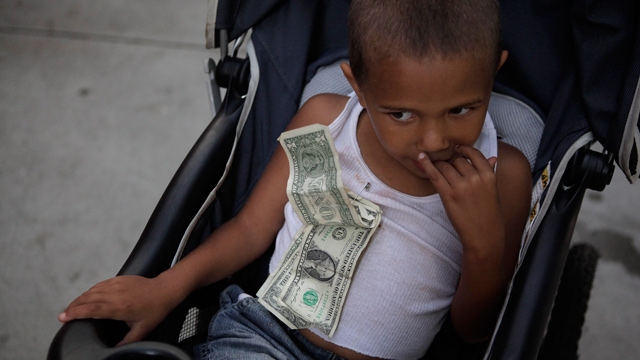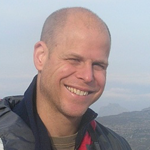We’re proud to collaborate with The Nation in sharing insightful journalism related to income inequality in America. The following post appeared first in Nation contributor Greg Kaufmann’s “This Week in Poverty” blog.

Four-year-old Nathan Hobbs, who lives in a homeless shelter with his mother, sits in a stroller with one-dollar bills he received for his birthday pinned to his chest in Los Angeles, Wednesday, September 14, 2011. (AP Photo/Jae C. Hong)
The forum was moderated by Marion Nestle, an award-winning author and the Paulette Goddard professor in the department of nutrition, food studies, and public health at New York University. Over 730 people packed the auditorium and two overflow rooms, 1,300 people watched the live webcast and #nycfoodforum trended nationally.
The candidates discussed a range of issues and ideas, including: utilizing 5,000 acres of unused land within the city limits for urban farming; ensuring living wages for food workers — 14 percent are currently on food stamps, and 90 percent earn below a living wage; boosting school meals — including universal breakfast in the classroom, and grab-and-go carts — to reduce child hunger; revamping city procurement to promote local and regional agriculture; incentivizing green markets to operate in more low-income neighborhoods and establishing transparent benchmarks on SNAP participation, free school meals, urban farming etc. to measure concrete progress in the effort to improve the food system.
“The food movement here is strong enough to have gotten six candidates to show up, take it seriously and answer questions,” said Nestle. “Don’t lose the momentum. This is just the beginning.”
“The massive turn out and heavy media coverage for this event should be a wake-up call to our national leaders,” said Joel Berg, executive director of New York City Coalition Against Hunger, one of twelve organizations that co-hosted the forum. “The reality is that the food and hunger movements are growing in political power and will hold politicians accountable for their actions on these issues.”
Watch the taped debate.
 |
Greg Kaufmann is a freelance writer and Nation contributor covering poverty in America, primarily through his blog, This Week in Poverty. His work has also been featured on MSNBC’s Melissa Harris-Perry show, CBSNews.com, NPR.org, WashingtonPost.com, Common Dreams and Alternet. He serves as an adviser for the Economic Hardship Reporting Project. |

